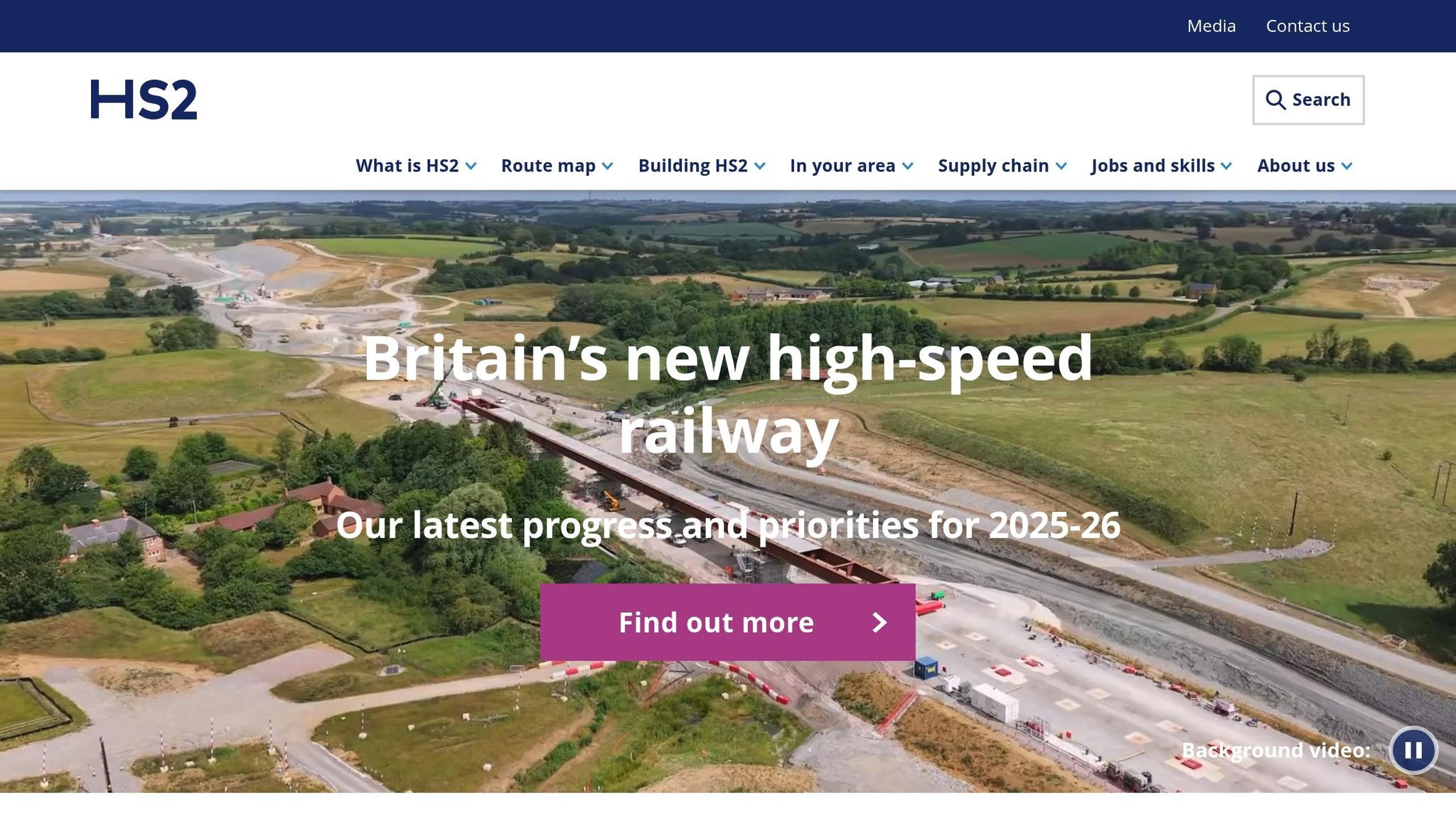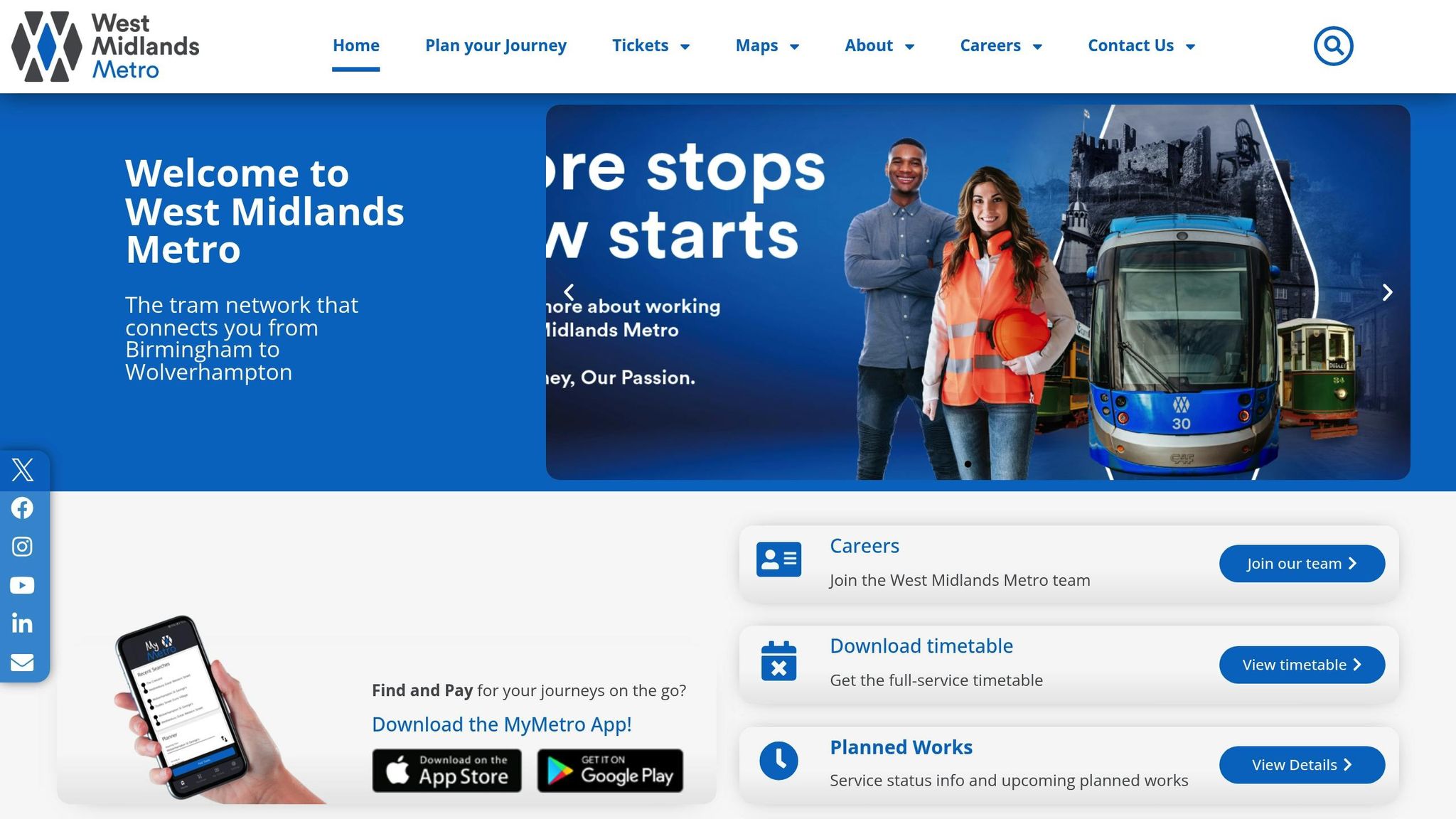Birmingham has evolved into a major business hub, attracting global firms through key infrastructure projects, urban regeneration, and improved connectivity. Here's why the city is becoming a prime destination for multinational companies:
- Transport Upgrades: High Speed 2 (HS2) will reduce travel times to London to just 52 minutes, making Birmingham highly accessible. The Midlands Metro extension further enhances local connectivity.
- Urban Regeneration: Projects like Smithfield and Paradise are transforming the city centre with modern office spaces, residential developments, and leisure facilities.
- Public-Private Partnerships: Collaborative funding and expertise have driven projects like the £200m Stone Yard Build-to-Rent scheme, creating jobs and housing.
- Economic Growth: Initiatives like the Birmingham Enterprise Zone aim to generate £2bn in business rates by 2046, alongside 50,000 new jobs.
- Tech Sector Expansion: Birmingham's tech workforce has grown by 152% since 2014, with average salaries reaching £76,500.
This combination of transport, regeneration, and collaboration makes Birmingham a compelling choice for businesses seeking a UK base outside London.
Building to Birmingham: 🚆 HS2's Curzon approaches progress update 🏗️

Major Infrastructure Projects Transforming Birmingham
Birmingham is undergoing a transformation, driven by flagship infrastructure projects that aim to position the city as a modern, globally attractive hub. These initiatives are not just about improving connectivity; they’re also breathing new life into the city’s economy and urban landscape, making it a magnet for multinational companies.
Smithfield Regeneration
The Smithfield regeneration project is set to revitalise a key part of Birmingham’s city centre. This ambitious plan will create a vibrant mixed-use district featuring homes, offices, shops, and leisure spaces. Sustainability is at the heart of this development, with energy-efficient buildings and smart technology playing a central role. The project is designed to enhance both urban living and business opportunities, blending modernity with a sustainable approach.
Curzon Street Station and HS2
Curzon Street Station is becoming a cornerstone of Birmingham’s transport network as part of the HS2 high-speed rail project. This station will provide faster, more efficient connections, making the city even more accessible for businesses and commuters alike. Surrounding the station, new developments are being tailored to meet the needs of modern enterprises, creating a dynamic environment that fosters growth and innovation.
Midlands Metro Extension

The Midlands Metro extension is another key piece of Birmingham’s transformation, enhancing connectivity across the city. By linking business districts with residential areas, this modernised transport system offers a greener commuting option that aligns with Birmingham’s environmental ambitions. The Metro upgrade not only makes daily travel more convenient but also strengthens the city’s reputation as an attractive location for international businesses, thanks to its forward-thinking infrastructure.
How Public-Private Partnerships Drive Urban Growth
Birmingham's remarkable transformation has been fuelled by public–private partnerships, blending the vision of public authorities with the resources and expertise of private organisations.
This collaborative model brings together Birmingham City Council, national agencies, and private developers. By pooling diverse funding sources, it ensures projects remain financially viable while delivering benefits to the community. Such partnerships create a funding structure that can withstand economic challenges and deliver lasting value.
Investment and Job Creation Results
One standout example of this approach is the Stone Yard Build-to-Rent project in Digbeth. This £200 million development illustrates how these partnerships can breathe new life into underused brownfield sites, turning them into vibrant communities.
The Stone Yard project is an impressive display of teamwork among multiple stakeholders. Funding came from NatWest, Homes England, Aviva Capital Partners, and the West Midlands Combined Authority, with Caddick Construction leading the build and Moda managing the operations. Together, they have brought this ambitious vision to life.
The development will deliver 995 homes across seven blocks, with the first phase of 605 homes set to be completed by 2028. Thanks to the West Midlands Combined Authority's brownfield grant funding, 20% of these homes will be affordable, ensuring the project benefits a broader range of residents.
Long-term Urban Planning Approach
Beyond individual projects, Birmingham’s long-term urban planning strategy is key to its sustainable growth. These partnerships focus on creating a city that not only appeals to multinational companies but also serves its residents for decades to come.
Instead of chasing short-term gains, Birmingham’s public–private collaborations prioritise developments that align with the city’s overarching vision. This ensures that projects are not just commercially sound but also contribute to building thriving, enduring communities.
One major advantage of this model is the ability to coordinate infrastructure delivery. Rather than developing transport, utilities, and digital networks in isolation, these partnerships enable an integrated approach. This not only reduces costs but also ensures better outcomes for businesses and residents alike.
Public partners provide regulatory stability and some funding, while private entities contribute their expertise and additional capital. By sharing risks, this model makes even complex projects, like brownfield regenerations, more feasible without overburdening public finances. Such developments often require significant upfront investment and specialist knowledge, making collaboration essential.
The long-term planning approach also builds economic resilience. By involving a mix of stakeholders with varied goals and timelines, projects are designed to adapt to shifting economic conditions. This makes Birmingham a stable and attractive option for global companies looking to establish a long-term presence.
sbb-itb-1ad140f
What Makes Birmingham Attractive to Multinational Companies
Birmingham has become a prime destination for global companies, thanks to its ambitious urban regeneration projects, improved transport infrastructure, and growing pool of skilled workers. These developments make it a strategic location for businesses looking to establish a strong foothold in the UK.
Take the Paradise redevelopment as an example. This £1.2 billion project has already delivered 1.74 million square feet (around 161,700 m²) of office space, 370 build-to-rent homes, and 120,000 square feet (roughly 11,150 m²) of retail and leisure facilities. In 2023, the completion of One Centenary Way - a 280,000 square feet (about 26,000 m²) modern office building - marked another milestone. The next phase, set for 2025, will introduce the Octagon residential tower and Three Chamberlain Square, a 189,000 square feet (approximately 17,570 m²) office building.
Adding to this is the Birmingham Enterprise Zone, which spans 39 sites across 113 hectares. This initiative is projected to generate over £2 billion in business rates income by March 2046. Combined with excellent transport links, these investments create a robust foundation for Birmingham's economic growth.
The HS2 project plays a crucial role as well, employing more than 28,000 people and further accelerating the city's economic trajectory.
Economic Benefits of Infrastructure Improvements
The city's transformation is encapsulated in the Big City Plan, which Birmingham City Council describes as "the most ambitious, far-reaching development project ever undertaken in the UK". This plan outlines the creation of 1.5 million square metres of new floorspace, the generation of over 50,000 jobs, and an annual £2.1 billion boost to the local economy. Furthermore, it includes 65,000 square metres of new public spaces and 28 kilometres of upgraded walking and cycling routes, improving both quality of life and the city’s ability to attract and retain talent. The local rental market is also predicted to grow by 22.2% over the next five years, reflecting strong economic confidence.
Birmingham's Advantages Over Other UK Cities
Birmingham's regeneration efforts and transport upgrades give it a distinct edge over other UK cities, making it an appealing choice for multinational firms:
| Factor | Birmingham's Advantage | Impact for Multinational Companies |
|---|---|---|
| Connectivity | HS2 will cut travel times to London to just 52 minutes | Eases access to national and international markets |
| Development Scale | 1.5 million m² of new floorspace and £2.1bn annual impact | Offers state-of-the-art facilities for business growth |
| Talent Pool | Over 50,000 new jobs expected | Expands the skilled workforce available for businesses |
| Sustainability | Focus on sustainable urban planning | Aligns with corporate ESG goals and ensures longevity |
Birmingham's central location, coupled with its coordinated investment strategy, makes it an increasingly competitive option for multinational companies. With HS2 turning the city into a commuter-friendly hub, it’s also attracting Londoners seeking more affordable housing, which further strengthens its talent pool.
Connecting Birmingham: Supporting Local Tech Talent
Birmingham's tech scene is booming, fuelled by ongoing infrastructure projects and a growing demand for digital expertise. The West Midlands is expected to add 52,000 digital tech jobs by the end of 2025, and Birmingham's tech workforce has already seen a staggering 152% growth from 2014 to 2023, now standing at 56,000 professionals. This rapid expansion brings both exciting opportunities and the challenge of connecting skilled talent with the right companies. Bridging this gap has become essential for sustaining the city's tech momentum.
Connecting Birmingham steps in as the link between the city's thriving tech industry and its growing pool of professionals. Designed specifically for Birmingham's tech ecosystem, the platform helps job seekers and employers navigate the city's digital transformation with ease.
The numbers speak volumes: tech roles in Birmingham now command an average salary of £76,500 - a 19.5% increase - reflecting the influx of multinational investments and the rising value of tech talent.
Tools for Job Seekers
For tech professionals looking to grow their careers, Connecting Birmingham offers tailored support. One standout feature is its verified company profiles, which provide clear insights into workplace culture, values, and team dynamics. This helps job seekers make well-informed decisions about their next move. The platform also ensures users are only exposed to genuine opportunities through its rigorous verification process and frequent job updates.
Connecting Birmingham goes a step further by directly linking professionals with companies expanding in the city. These include well-established local tech firms as well as newcomers attracted by Birmingham's improved connectivity and vibrant business environment.
Services for Tech Employers
For tech companies setting up or expanding operations in Birmingham, finding the right talent can be a challenge. Connecting Birmingham's Verified Company Directory helps employers stand out by showcasing their culture, growth trajectory, and commitment to the local economy. The platform's vetting process ensures that job seekers are matched with authentic opportunities, while employers gain access to candidates specifically drawn to Birmingham-based roles.
Employers can also create detailed profiles to highlight their role in advancing Birmingham's economic development, a key consideration for multinational firms investing in the area. For those looking to boost their reach, the platform offers enhanced visibility services, helping companies tap into Birmingham's tech talent pool, including professionals relocating from London.
Conclusion: Birmingham's Future as a Global Business Hub
Birmingham's ongoing transformation highlights its rising appeal to international businesses. Through significant infrastructure projects like the Smithfield regeneration and the improved HS2 connectivity, the city has established itself as a place where global companies can thrive. These advancements not only enhance transport links and modern facilities but also set the stage for future growth driven by collaboration and skilled talent.
Strategic public–private partnerships have been instrumental in delivering key projects that improve connectivity, expand office spaces, and strengthen transport networks.
Building on these achievements, Birmingham’s forward-thinking urban strategy combines cutting-edge infrastructure with a vibrant talent pool, creating opportunities for sustainable growth. Platforms like Connecting Birmingham play a vital role by linking local tech talent with reputable employers, ensuring that infrastructure improvements translate into tangible career opportunities.
With its focus on strategic investments, collaborative initiatives, and nurturing talent, Birmingham is well-positioned to solidify its place as a leading global business hub, attracting firms from around the world.
FAQs
How are public-private partnerships driving Birmingham’s urban regeneration and economic growth?
Public-private partnerships (PPPs) have been a driving force behind Birmingham's ongoing transformation. By bringing together government bodies and private enterprises, these collaborations help streamline infrastructure projects, attract major investments, and distribute risks and resources more effectively.
Thanks to PPPs, Birmingham has witnessed the rise of modern transport systems, rejuvenated urban areas, and forward-thinking business hubs. These developments not only enhance the city's economic strength but also breathe new life into its urban landscape. By empowering local businesses and opening doors for growth, PPPs are playing a key role in establishing Birmingham as a sought-after destination for global companies and top talent.
How will the HS2 project improve Birmingham’s appeal to multinational companies?
The HS2 project promises to revolutionise how Birmingham connects with the rest of the UK. With travel times from London to Birmingham slashed to just 45 minutes, it’s not just about speed - it’s about creating a more efficient and reliable transport network. This step-change in accessibility is expected to make Birmingham an even more appealing base for multinational companies, simplifying business travel and encouraging fresh investment.
Beyond faster journeys, HS2 is poised to fuel economic growth, generate thousands of new jobs, and breathe new life into urban areas. These changes are set to solidify Birmingham’s standing as a vibrant business hub, making it an attractive choice for global companies looking for a dynamic and well-connected location in the UK.
How is Birmingham’s tech sector growing, and why is it attracting global companies?
Birmingham’s tech industry has seen a remarkable rise, with jobs in the sector growing by more than 150% since 2014. This growth underlines the city’s evolution into one of the UK’s key centres for innovation.
Major infrastructure upgrades, including the construction of the HS2 station at Curzon Street and extensive urban regeneration projects, are enhancing connectivity and reshaping the city. Paired with a vibrant tech scene, these developments position Birmingham as an appealing choice for multinational companies seeking a dynamic and well-connected base for investment.


